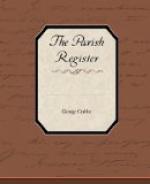be,
Would Heav’n take those my spouse assigns to me.”
Aged were both, that Dawkins, Ditchem this,
Who much of marriage thought, and much amiss;
Both would delay, the one, till—riches gain’d,
The son he wish’d might be to honour train’d;
His Friend—lest fierce intruding heirs should come,
To waste his hoard and vex his quiet home.
Dawkins, a dealer once, on burthen’d back
Bore his whole substance in a pedlar’s pack;
To dames discreet, the duties yet unpaid,
His stores of lace and hyson he convey’d:
When thus enriched, he chose at home to stop,
And fleece his neighbours in a new-built shop;
Then woo’d a spinster blithe, and hoped, when wed,
For love’s fair favours and a fruitful bed.
Not so his Friend;—on widow fair and staid
He fix’d his eye, but he was much afraid;
Yet woo’d; while she his hair of silver hue
Demurely noticed, and her eye withdrew:
Doubtful he paused—“Ah! were I sure,” he cried,
No craving children would my gains divide;
Fair as she is, I would my widow take,
And live more largely for my partner’s sake.”
With such their views some thoughtful years they pass’d,
And hoping, dreading, they were bound at last.
And what their fate? Observe them as they go,
Comparing fear with fear and woe with woe.
“Humphrey!” said Dawkins, “envy in my breast
Sickens to see thee in thy children blest:
They are thy joys, while I go grieving home
To a sad spouse, and our eternal gloom:
We look despondency; no infant near,
To bless the eye or win the parent’s ear;
Our sudden heats and quarrels to allay,
And soothe the petty sufferings of the day:
Alike our want, yet both the want reprove;
Where are, I cry, these pledges of our love?
When she, like Jacob’s wife, makes fierce reply,
Yet fond—Oh! give me children, or I die:
And I return—still childless doom’d to live,
Like the vex’d patriarch—Are they mine to give?
Ah! much I envy thee thy boys, who ride
On poplar branch, and canter at thy side;
And girls, whose cheeks thy chin’s fierce fondness know,
And with fresh beauty at the contact glow.”
“Oh! simple friend,” said Ditchem, “wouldst thou gain
A father’s pleasure by a husband’s pain?
Alas! what pleasure—when some vig’rous boy
Should swell thy pride, some rosy girl thy joy;
Is it to doubt who grafted this sweet flower,
Or whence arose that spirit and that power?
“Four years I’ve wed; not one has passed in vain;
Behold the fifth! behold a babe again!
My wife’s gay friends th’ unwelcome imp admire,
And fill the room with gratulation dire:
While I in silence sate, revolving all
That influence ancient men, or that befall;
A gay pert guest—Heav’n knows his business—came;
A glorious boy! he cried, and what the name?
Angry I growl’d,—My spirit cease to tease,
Name it yourselves,—Cain, Judas, if you
Would Heav’n take those my spouse assigns to me.”
Aged were both, that Dawkins, Ditchem this,
Who much of marriage thought, and much amiss;
Both would delay, the one, till—riches gain’d,
The son he wish’d might be to honour train’d;
His Friend—lest fierce intruding heirs should come,
To waste his hoard and vex his quiet home.
Dawkins, a dealer once, on burthen’d back
Bore his whole substance in a pedlar’s pack;
To dames discreet, the duties yet unpaid,
His stores of lace and hyson he convey’d:
When thus enriched, he chose at home to stop,
And fleece his neighbours in a new-built shop;
Then woo’d a spinster blithe, and hoped, when wed,
For love’s fair favours and a fruitful bed.
Not so his Friend;—on widow fair and staid
He fix’d his eye, but he was much afraid;
Yet woo’d; while she his hair of silver hue
Demurely noticed, and her eye withdrew:
Doubtful he paused—“Ah! were I sure,” he cried,
No craving children would my gains divide;
Fair as she is, I would my widow take,
And live more largely for my partner’s sake.”
With such their views some thoughtful years they pass’d,
And hoping, dreading, they were bound at last.
And what their fate? Observe them as they go,
Comparing fear with fear and woe with woe.
“Humphrey!” said Dawkins, “envy in my breast
Sickens to see thee in thy children blest:
They are thy joys, while I go grieving home
To a sad spouse, and our eternal gloom:
We look despondency; no infant near,
To bless the eye or win the parent’s ear;
Our sudden heats and quarrels to allay,
And soothe the petty sufferings of the day:
Alike our want, yet both the want reprove;
Where are, I cry, these pledges of our love?
When she, like Jacob’s wife, makes fierce reply,
Yet fond—Oh! give me children, or I die:
And I return—still childless doom’d to live,
Like the vex’d patriarch—Are they mine to give?
Ah! much I envy thee thy boys, who ride
On poplar branch, and canter at thy side;
And girls, whose cheeks thy chin’s fierce fondness know,
And with fresh beauty at the contact glow.”
“Oh! simple friend,” said Ditchem, “wouldst thou gain
A father’s pleasure by a husband’s pain?
Alas! what pleasure—when some vig’rous boy
Should swell thy pride, some rosy girl thy joy;
Is it to doubt who grafted this sweet flower,
Or whence arose that spirit and that power?
“Four years I’ve wed; not one has passed in vain;
Behold the fifth! behold a babe again!
My wife’s gay friends th’ unwelcome imp admire,
And fill the room with gratulation dire:
While I in silence sate, revolving all
That influence ancient men, or that befall;
A gay pert guest—Heav’n knows his business—came;
A glorious boy! he cried, and what the name?
Angry I growl’d,—My spirit cease to tease,
Name it yourselves,—Cain, Judas, if you




